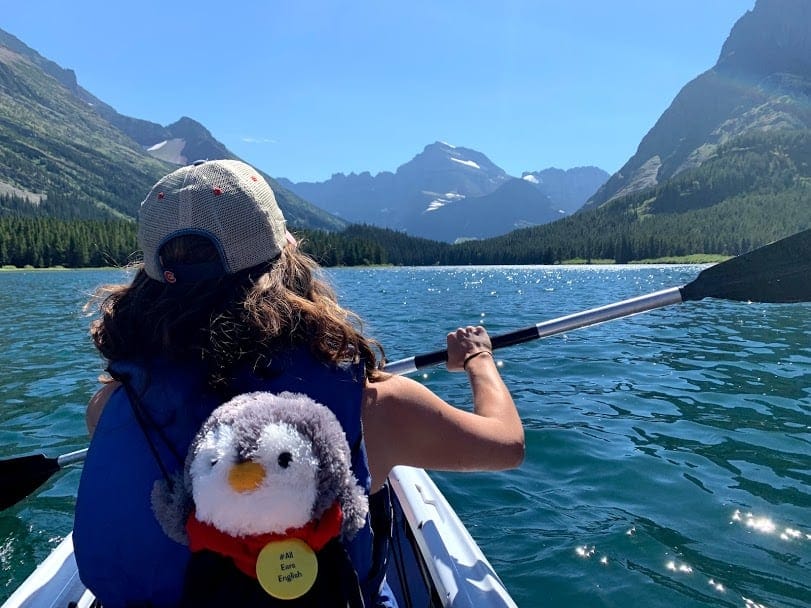
Do you ever go for hikes?
Do you like to talk about some of your longest treks in English?
If you have heard these two words in conversation, then you have likely noticed that the differences between them are subtle.
We’re going to go through the differences between the words “hike” and “trek”, when to use them, and how you can make them a part of your conversations.
Get Your Transcripts Today!

Make sure you understand every word you hear on All Ears English.
Bring your English to the advanced level with new vocabulary and natural expressions.
Subscribe and get the transcripts delivered by email.
Learn to speak naturally with the American accent.
Click here to subscribe and save 50%
We got a really good question from one of our Instagram followers about this word!
Hi ladies,
I love listening to your show, and I learn so much! I still have a lot of questions, one of which I want to ask you now.
Can you tell me what is the nuance between hiking and trekking? I find this to be quite confusing, and I want to be sure that I am using it correctly.
Thank you for your help,
Milkyandginger
Understanding The Difference
This question may be one that you have had, because ultimately the difference is pretty subtle.
So what is the difference?
The words are very similar, but “hike” is used more frequently.
You would use “hike” to talk about a walk in nature or to see take in some sights outdoors.
Trek is used more generally, and may not be used quite as often.
Both “hike” and “trek” can be used as nouns and verbs.
An example would be “I went on a hike in the mountains with my friends yesterday.”
You wouldn’t replace “hike” with “trek” here because it wouldn’t sound the same, and it wouldn’t be as natural.
Trek can tend to have more of a personality, in terms of spunk or attitude.
Though hike may have some personality to it, it tends to be used in a more literal or general way.
You may likely hear trek used in a more sarcastic way, which can add to how fun it is.
Examples To Show This In Context
Seeing examples can always be quite helpful, particularly when you are looking at subtle differences.
There are times where “hike” may seem more natural, and there are times when “trek” may be a better fit.
You can use them interchangeably, but in most instances one tends to sound more natural than another in conversation. The difference is subtle. If you are taking IELTS this year you will want to understand and use subtle vocabulary differences like this to get a Band 7 instead of a Band 6.
Using Trek
These examples can show you times where trek may work much better.
“It’s a real trek to get all the way up to your apartment, but I’ll go because it’s your birthday.”
“I trekked all the way up 15 flights of stairs and she wasn’t even there yet!”
Though you could use hike here, it doesn’t necessarily have the same impact.
Hike is more general, and therefore “trek” has more personality or sarcasm to it–that’s why it works better in these examples.
Using Hike
There are times when hike in the more general way works best, and you can almost feel that when you are saying it.
“It’s a real hike to get up to your apartment, but I’ll go because it’s your birthday.”
“I hiked all the way up 15 flights of stairs…”
In general this is a more interesting way to say that something took a long time, or that it was a long trip.
Though they can both be used in any of the examples, there are times when you are going to feel that “trek” or “hike” works best.
The differences may be subtle but look for cues and what feels more natural to say in a sentence.
Other Phrases Using The Word Hike
Believe it or not there are plenty of phrases that use the word “hike” in them.
You might have heard these in conversation, and you might even have interest in using them yourself.
These phrases are all different in their usage, but they all share the word “hike” in a unique way.
- “What a hike!”: This is a perfect example of how you would use the word “hike” over trek. You aren’t likely to say “what a trek” but you could easily say “what a hike!” This exclaims that the hike was interesting, memorable, or even exhausting. You could say something like “It took me two hours to get to work today. What a hike!”
- “Take a hike!”: This is not a nice saying, and it’s actually quite rude. It gets your point across, but not in a very nice way at all. You are saying I can get out of your way or something rude to get the other person’s attention negatively. You could have a dialogue that goes like this: “A: You never cared about me anyway! B: Oh take a hike!”
Once you know a word and its meaning or subtle differences, you can use it properly in conversation.
This is a perfect example of how you might use “hike” in a common way in conversation, and it’s a great thing to practice.
Takeaway
These two words are quite similar but there are subtle differences.
Sometimes it is those subtle differences can be the hardest to detect.
You want to be sure you know which one works best in the conversation that you are using.
Try each one out, practice them in conversation, and as with everything else it will feel natural to you the more that you use them.
If you have any questions, please leave them below in the comments section.
We’ll get back to you as soon as we can.








